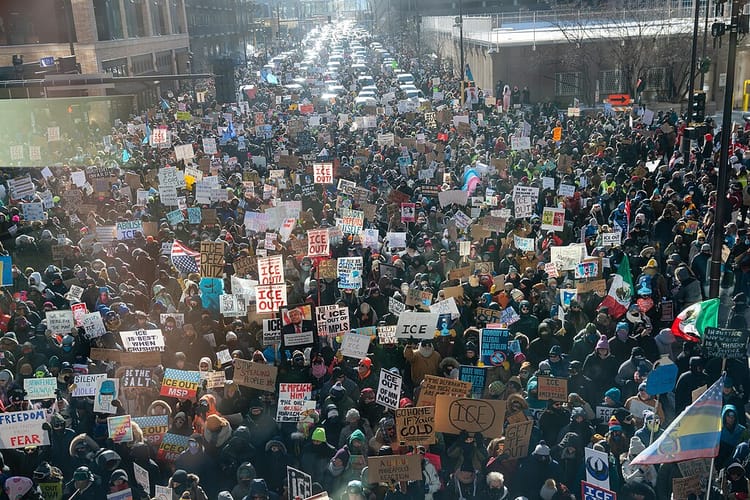Massive Media Cuts = Less Climate Coverage

If you don't work in media, you might have missed the steady drumbeat of layoff announcements from various newsrooms over the past six months or so. With 100 layoffs here, 20 there, they have also been overshadowed by the thousands of jobs cut from the tech industry. But there are way fewer reporters than there are tech workers, and the steady loss of them is going to eventually mean a decline in climate reporting and particularly a decline in the most time-consuming and expensive type of reporting: investigative journalism, which also tends to be the one with the best shot at actually catalyzing change.
Late last year, CNN, BuzzFeed, Gannett, and Vice announced layoffs. News in particular saw a massive 20 percent spike in job cuts from 2021 to 2022. Now, just two months into 2023, Vox, Adweek, NBC News, and MSNBC have announced major cuts. This week NPR joined the wave, announcing a 10% reduction in its workforce (around 100 positions) and a hiring freeze. The Washington Post started bracing for layoffs in December, and they have now officially begun.
At the same time, all those great climate reporting initiatives that were announced in late 2021 and early 2022 seem to have mostly resulted in a handful of essays, opinion pieces, and newsletters. Nothing against any of those, but they don't tend to be the pieces that arm senators with the documents or context they need to argue for substantial policy change.
What does all this mean for climate coverage? So far, a lot of climate reporters have survived the cuts. That's great news. But at the same time that newsrooms are losing staff, disinformation just keeps gaining steam. Plus those remaining reporters are now working with editors who are being tasked with twice the work in the same amount of time. I've seen the difference myself, starting about the middle of last year: it takes longer to get a green light on a story, longer to get an edit back, longer to get a story published. And there are fewer outlets these days too. In addition to the layoffs, the past 12 months have brought quite a few announcements of outlets shutting down altogether. Protocol, the tech arm of Politico, which was starting to do some great climate reporting under the steady hand of former Earther editor Brian Kahn, suddenly anounced its departure last fall. Around the same time, The Washington Post shut down its magazine and laid off the entire staff.
It's also telling that the media industry, like most other industries, is seeing a union boom. The jobs that remain pay less than they ever have, for an increasing amount of work. It's not unusual to see salaries and hourly wages for reporters that are lower than what I've seen posted for cashiers at fast-food restaurants. And a huge number of outlets have continued the long-standing shift towards using more contract labor, making these jobs as unstable as they have ever been.
Meanwhile, every month or so I hear from an "investigator" working for a team within an NGO. A team with more funding and stability than any newsroom in the world, but also with a very specific mandate that's usually not just informing the public. Now look, NO ONE is saying that mainstream media in particular is some bias-free utopia with no influece or agenda. The corporate hold over media in the U.S. in particular has been well documented (yes, I've read Ben Bagdikian and Manufacturing Consent!). But I don't know that the solution is to let NGOs take over investigative journalism entirely. Encouraging journalists to get comfortable with simply being fed scoops—whether they're coming from corporations or organizations funded by wealthy philanthropists—feels like a dangerous path, not just for climate reporting, but for democracy in general.
If it continues to be relatively easy to use the media as a tool, no matter who's doing the using, who exactly does that benefit? Probably not the public. So...what's the solution? I don't know! But it seems increasingly obvious to me that we really need to grapple with the business model of media and the role it plays in society to have any hope of tackling the climate crisis.
Thanks for being a subscriber! This weekly newsletter is free and will always remain so. But if you want to support independent investigative journalism, you can do that by upgrading to a paid subscription, which will get you early access to various projects we've got cooking plus ad-free podcasts episodes. If you have ideas for other bonus content, I'm all ears! (amy at criticalfrequency dot org).
This Week's Climate Must-Reads
- Malpass Is Out at the World Bank, but Biden's Pick Is Not Exactly a "Climate Guy" (FT). The Trump-appointed president of the World Bank David Malpass resigned suddenly earlier this month, opening up the opportunity for the U.S., which historically picks the bank's leader, to appoint someone new. Development officials and climate activists had been hoping President Biden would tap someone with a deep understanding of climate finance but he has...not. Ajay Banga, the U.S. nominee, was previously CEO of Mastercard. He has a track record of managing large sums of money, but apart from a few posts here and there about the need for climate action and an initiative to ban single-use plastic in the company cafeteria, his climate cred is pretty slim.
- The Angels of the Nile Are Dying (Atmos) As the Nile River begins to dry up, it has displaced thousands of Nubains. Atmos's "The Frontline" explores how climate change threatens their cultural connections to the river even more.
- With Carbon Dioxide Removal, Biological Options Are Far Superior (Study, Plos Climate) In this eye-opening study, economist June Sekera performed a biophysical input-outcome analysis, focusing on the U.S., to compare various proposed methods of carbon dioxide removal, including both technical/mechanical methods and biological methods (trees, soil capture and so forth). The study's finding? "Biological methods are both more effective and more resource efficient in achieving a climate-relevant scale of CO2 removal. Additionally, the co-impacts of biological methods are largely positive, while those of mechanical methods are negative. Biological methods are also far less expensive. Despite their disadvantages and a track record of failure to date, mechanical CDR methods continue to receive large subsidies from the US government while biological sequestration methods do not.
- Heat Waves Are Killing More Homeless People (LA Times). What happens to unhoused people as extreme weather becomes more common? This deeply reported piece from the LA Times looks at the impact the area's heat waves are having on Los Angeles's large and growing homeless population. Although that population represents less than 1 percent of the city's total residents, they accounted for nearly half of all heat-related deaths last year.
- The "backlash" against ESG is a myth (Study, GSG). Despite a whole lot of noise from rightwing state politicians like Texas Attorney General Ken Paxton and various state treasurers, the public remains largely in favor of Environmental, Social and Governance (ESG) guidelines for companies and investments according to a report out this week from Democratic consulting firm Global Strategy Group. According to the firm's polling, 88 percent of Americans approve of companies that have a positive impact on their communities and 77 percent agree that corporations have a responsibility to bring about social change on important issues facing society.





